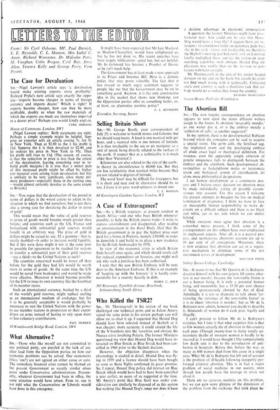The Abortion Bill
Sets,—The now lengthy correspondence on abortion appears to turn upon the status different writers assign to the foetus. Is abortion 'invariably murder,' as one writer put it, or is the embryo merely a 'collection of cells.' as another suggested?
In my opinion, there is no developmental Rubicon beyond which the conceptus can be said to acquire a special status. The germ cells, the fertilised egg, the implanted ovum and the developing embryo all elude exact legal or theological definition. For instance, even the apparently simple criterion of genetic uniqueness fails to distinguish between the embryo and the afterbirth. Such developmental ab- normalities as hydatidiform moles or teratomata strain any biological system of classification, let alone more philosophical designations.
I see human development as a continuous pro- cess and I believe every decision on abortion must be made individually, taking all possible circum- stances into account. For this reason I welcome the present attempts to broaden the law on medical termination of pregnancy. I think we have to face an inescapable human responsibility to make de- cisions on a difficult subject and there is no black and white, yes or no, rule which we can shelter behind.
While everyone must agree that abortion is a somewhat messy process. I think some of the correspondents on this subject have over-emphasised its unpleasant aspects. After all, it is a natural pro- cess, and spontaneous abortions account for up to 10 per cent of all conceptions. Moreover, there is now evidence that abortion can act as a regula- tory mechanism to eliminate some of the not uncommon errors of development.
MALCOLM POTTS
Sidney Sussex College, Cambridge





























 Previous page
Previous page